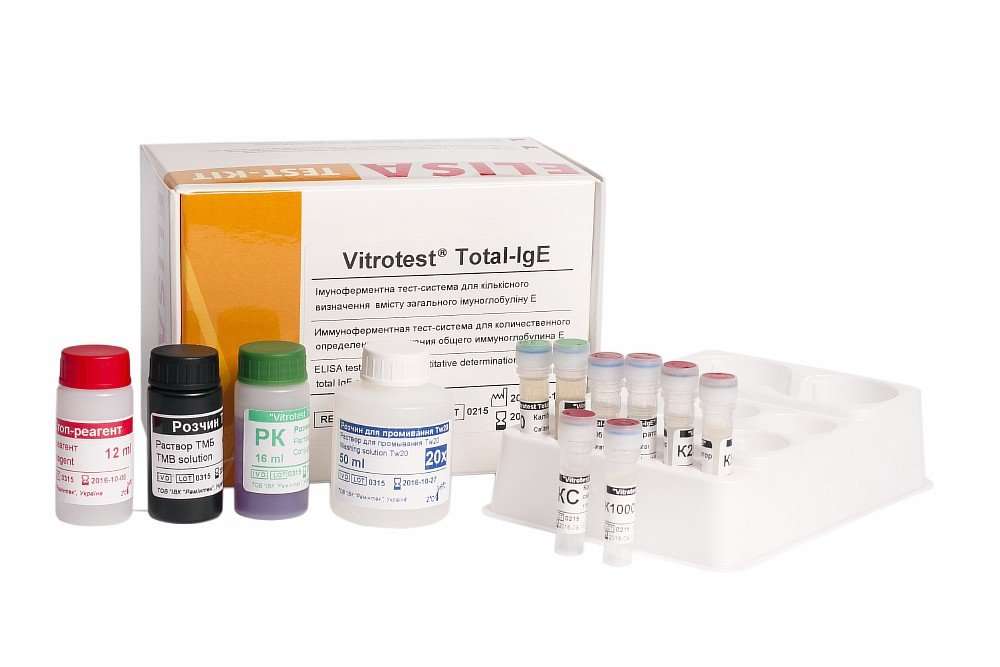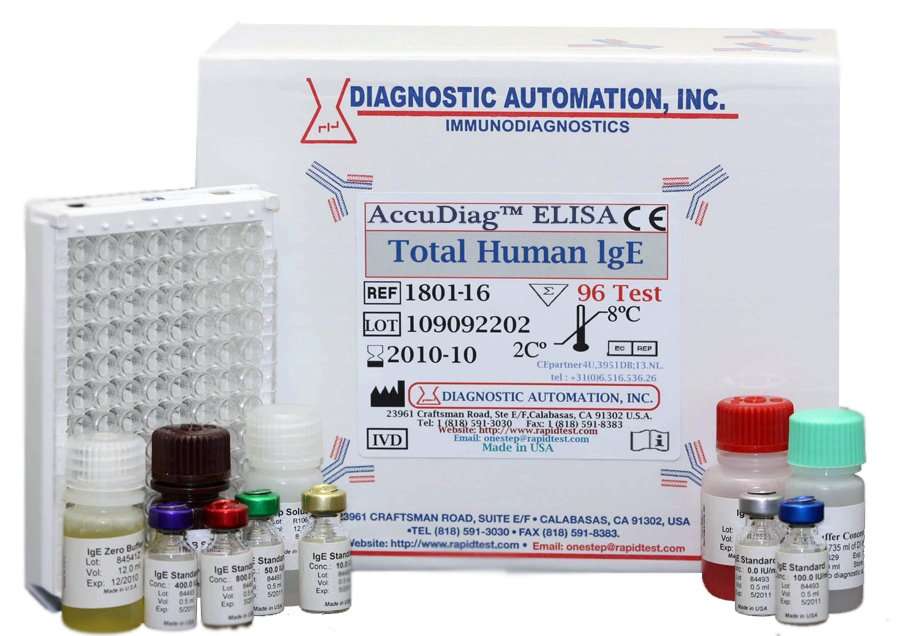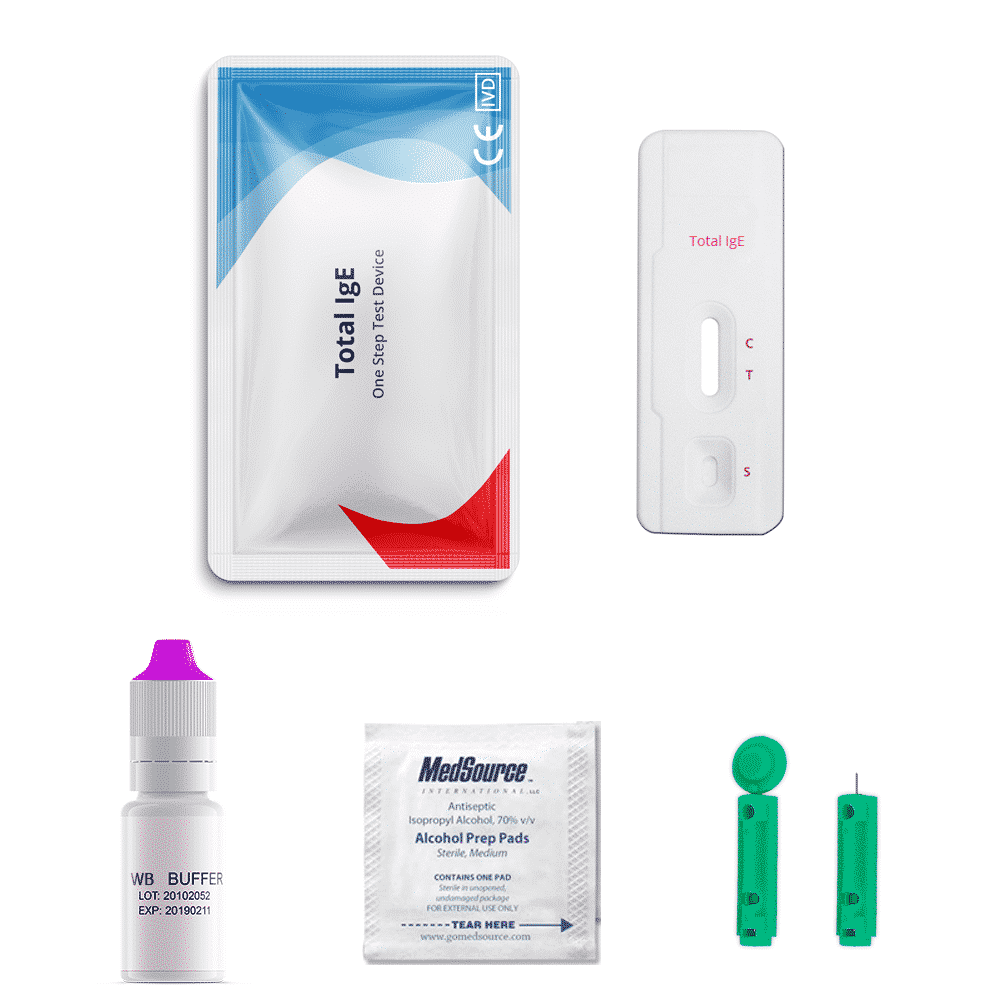What Is Being Tested
Immunoglobulin E is an antibody that is produced by the bodys immune system in response to a perceived threat. It is one of five classes of immunoglobulins and is normally present in the blood in very small amounts. This test measures the amount of IgE in the blood.
Immunoglobulins are proteins that play a key role in the bodys immune system. They are produced by specific immune cells called plasma cells. Immunoglobulins are produced in response to bacteria, viruses, and other microorganisms as well as substances that are recognized as non-self or present harmful antigens to the immune system.
Immunoglobulin E is associated with allergic responses, including asthma, and to a lesser degree with immunity to parasites. With allergies, the body overreacts to one or more substances in the environment called allergens that do not typically cause a response in other people. Someone may develop an allergy when that person is exposed to an allergen, such as plant pollen, peanuts, eggs, strawberries, bee venom, and hundreds of other potential substances.
The total IgE test measures the overall quantity of immunoglobulin E in the blood, not the amount of a specific type. It can be used to detect an allergic response in the body rather than a specific allergy. This test may compliment the information provided by allergy tests that detect allergen-specific IgE.
How Much Does The Ige Allergy Test Cost
IgE allergy test costs range from $49 to $69 in different labs and facilities across the US. Prior appointment isnt required. You can order tests online by comparing the price or visiting the nearest lab during lab business hours. You will get the results in your email in 2 to 3 business days after completing the procedure. Apart from this, doctor consultation is available for any kind of further treatment or medical advice.
The table below shows the IgE allergy test provider and their prices. You can know more and book the test by clicking on the Book Now button. All the labs are certified and offer a network across the US.
What Is An Ige Allergy Test
IgE allergy test measures the amount of IgE antibodies in your blood. This blood test is used to find out if you have an allergy. A total IgE test measures the overall number of IgE in the blood. And the other type of allergy blood test called a specific IgE test measures the level of IgE antibodies in response to individual allergens. A small amount of IgE antibodies is normal but a larger amount may mean you have an allergy.
IgE allergy test is also called allergy blood test, Quantitative IgE, Immunoglobulin E, Total IgE, Specific IgE.
Also Check: Claritin Indoor Outdoor Allergies
When Is It Ordered
A total IgE test may be ordered when a person has periodic or persistent symptoms that may be due to an allergic reaction, especially when the potential allergen is unknown. Symptoms may include those that suggest skin, respiratory, and/or digestive involvement, such as:
- Periodic or persistent itching
- Difficulty breathing
- Asthma symptoms: wheezing, breathlessness, coughing, tightness in the chest
Sometimes an IgE may be ordered as a screening test when a person has persistent diarrhea that may be due to a parasitic infection. In addition, a complete blood count with white blood cell differential may be ordered to determine if the number of eosinophils is increased.
What Does The Result Mean

When the total IgE levels are higher than normal it indicates that the person likely has an allergy. However, it doesnt reveal what you are allergic to. The specific IgE test can identify your particular allergy. And when results indicate an allergy, your doctor may refer you to an allergy specialist or recommend a treatment plan. Your treatment will depend on the type & severity of your allergy.
A negative test result means you probably dont have a true allergy. In other words, your immune system probably does not respond to the allergen tested. But it is also possible to have a normal test result and still have an allergy. So, allergy blood test results should be interpreted with caution by an allergy specialist. And doctors will also consider your medical history and symptoms when diagnosing a specific allergy.
You May Like: Claritin Zyrtec Together
What Is A Type I Hypersensitivity Reaction
Following exposure and re-exposure to an antigen in susceptible individuals, a type I, or immediate, allergic reaction involves antigen-presenting cells, the activation of T-helper cells, the stimulation of B cells that release specific IgE, and the release of various pharmacological mediators from mast cells and basophils. The release of the mediators causes symptoms such as sneezing, wheezing, and weals.
Type 1 IgE-mediated hypersensitivity reaction pathway
Credit: Gaurab Karki, Microbiologist Kathmandu, via Online Biology Notes.
What Do The Results Mean
If your total IgE levels are higher than normal, it likely means you have some kind of allergy. But it does not reveal what you are allergic to. A specific IgE test will help identify your particular allergy. If your results indicate an allergy, your health care provider may refer you to an allergy specialist or recommend a treatment plan.
Your treatment plan will depend on the type and severity of your allergy. People at risk for anaphylactic shock, a severe allergic reaction that can cause death, need to take extra care to avoid the allergy-causing substance. They may need to carry an emergency epinephrine treatment with them at all times.
Be sure to talk to your health care provider if you have questions about your test results and/or your allergy treatment plan.
Learn more about laboratory tests, reference ranges, and understanding results.
You May Like: Are There Peanuts In Twix
What Are The Lifestyle And Home Remedies For People With Food Allergies
There are several strategies that you can focus on when managing food allergies.
-
Avoiding allergen inducing foods that are causing the issue.
-
Ensuring adequate natural lighting and exposure to ample sunlight.
-
Aiming for a minimum of 8 hours of sleep for optimal repair and recovery.
-
Regularly getting tested for allergies that can be caused by food.
-
Improving immunity and overall micro-nutrient and vitamin profile.
-
Consulting with your doctor regularly for allergen testing.
What Is The Difference Between Igg And Ige
Unlike an IgG test , which only measures the common antibody immunoglobulin G and doesn’t accurately predict specific food allergies, an IgE test focuses on the class of antibody that’s directly associated with allergic reactions â giving you much more specific results when it comes to identifying allergic triggers.
Read Also: Does Twix Have Nuts
What It Can Test For
A total IgE test can provide a patient with details on the quantity of Immunoglobulin E antibodies that are present in the blood. This can also help a physician determine if the patient may be suffering from an allergic disease. The data provided can then help the physician identify more specific IgE tests to be performed, such as to identify cat allergies, dog allergies, or even allergic reactions to specific foods. Other conditions that may also cause an elevated total IgE level include allergic asthma, atopic eczema, Hyper IgE syndrome, Wiskott-Aldrich syndrome, and even, in some cases, a parasitic infection.
What Is Total Ige
Total IgE measures blood levels of antibodies produced by your immune system in response to allergens.
Immunoglobulin E is an antibody that initiates an allergic reaction. When you are exposed to an allergenâa normally non-harmful substance that the immune system assumes is dangerous, like peanutsâyour body makes specific IgE antibodies designed to recognize that allergen in the future. Then, when you are re-exposed to the same allergen, your immune system quickly produces a large amount of allergen-specific IgE particles to identify and eliminate the allergen.
Read Also: Is Zyrtec Good For Allergic Reaction
Other Skin Testing Methods
Intradermal testing should not be used to test for allergy to inhalants or foods. Instradermal testing was used in the past, however it is less reliable than skin prick testing, and causes much greater discomfort. Intradermal skin testing may be used to test for allergies to antibiotic drugs or stinging insect venom, when greater sensitivity is needed.
What Is An Ige Allergy Test Purpose Procedure And Test Cost

Allergy is a chronic condition that involves the bodys immune system. Researchers are not sure why the immune system causes an allergic reaction when a harmless foreign substance enters the body. Millions of Americans have allergies and it is the 6th leading cause of chronic illness in the US. Though allergies cant be cured, symptoms can be controlled by medications. IgE allergy test can help diagnose allergies and it can also be used to monitor the effectiveness of immunotherapy treatment.
This article covers all the significant topics related to the IgE allergy test such as the test cost, symptoms, preparation for tests, risk factor, and how to get tested for an IgE allergy test.
For our readers who are interested in knowing the IgE allergy test cost beforehand, we begin with that section.
Read Also: Allergic To Everything Disease
When Is An Allergy Blood Test Needed
You may need an allergy blood test if you have:
- Allergic rhinitis , usually the result of pollen, pet allergies or mold .
- Anaphylaxis, which is a severe and sometimes life-threatening allergic reaction to certain foods, insect stings or other allergens.
- Contact dermatitis, caused by contact with irritants such as chemicals, detergents, poisonous plants or certain metals .
Allergy symptoms may include:
- Wheezing, tightness in your chest or allergic asthma.
What Do Allergy Blood Test Results Mean
Everyone has some IgE in their blood, but elevated levels may indicate an allergy. Different labs use different brands of allergy blood tests, so the scoring system for results can vary from brand to brand. Allergy blood tests dont indicate the severity of an allergy. So if you do have an allergy, talk to your doctor about the risk of anaphylaxis. You may need to carry an emergency epinephrine injection with you at all times.
Recommended Reading: Keflex Allergy Alternative
What Does The Test Result Mean
An increased total IgE level indicates that it is likely that a person has one or more allergies. Allergen-specific IgE levels will increase after an exposure and then decline over time, thus affecting the total IgE level. If a person is allergic to a seasonal substance, such as pollen, then both the specific IgE and total IgE would be expected to increase during the time of year when the allergen is present. If someone has one or more food allergies, then the total IgE level would mirror exposures to these foods. If someone is allergic to something that they are constantly around, such as mold in a house or cat dander, then the total IgE level may be persistently increased.
An elevated level of total IgE indicates an allergic process is likely present, but it will not indicate what a person is allergic to. In general, the greater the number of things a person is allergic to, the higher the total IgE level may be. An IgE elevation can also indicate the presence of a parasitic infection but cannot be used to determine the type of infection.
A normal IgE level makes it less likely that a person has allergies but does not rule them out due to the length of time between exposures. In between exposures, a persons IgE level may drop.
Sometimes an individual has a condition that affects the immune system and will not produce normal amounts of immunoglobulins. In this case, a person could have an allergy that is not reflected by the total IgE test result.
What Are The Indications For Ige Testing
An IgE test is indicated when the taking of a careful patient history and an examination lead to a suspicion of type I allergy.
An IgE test can also be used for monitoring a patient with a known allergic condition, such as:
- Asthma
- Chronic rhinosinusitis.
IgE tests are also useful to determine whether a patient is allergic to a specific protein, such as:
- Grass, weed or tree pollens
- Animal dander or fur
- The venom of a bee or wasp.
An IgE test can be used when skin prick testing is not available or is unsuitable for example, in an individual with dermographism, extensive skin disease, recent use of antihistamines or systemic steroids, or when there is concern that prick testing could cause an anaphylactic reaction.
IgE testing is rarely indicated in atopicdermatitis, allergic contact dermatitis, chronic spontaneous urticaria, or angioedema as the relevance of elevated IgE is uncertain in these diseases.
You May Like: Can Seasonal Allergies Cause Swollen Lymph Nodes
How Does Ige Testing Compare With Skin Prick Testing
Skin prick testing is more specific than IgE testing and gives a rapid result , but it requires a trained practitioner and is not always tolerated by young children.
Specific IgE blood tests are simple and safe. They can be expensive, depending on the number of allergens tested. Caution is required when interpreting the results .
What Is The Normal Range For Ige
The test results are generally reported in kilounits of antibody per liter or nanograms per milliliter . The upper limits of IgE in the blood vary from person to person and in general blood tests are usually considered positive if the allergen-specific IgE level is greater than 0.35 kU/L. But for certain airborne allergens, sensitivity can be indicated by values as low as 0.12 kU/L.A positive or negative result needs to be interpreted by a doctor considering the patients condition, history, and risk factors.The chart indicates the normal IgE levels at various ages ):
| Age group |
| 3- 423 |
Recommended Reading: Is Twix Peanut Free
Is The Ige Test Safe During Pregnancy
There are no restrictions on pregnant women from undergoing an IgE test. Many pregnant women suffer from allergies like rhinitis, asthma, conjunctivitis, acute urticaria, anaphylaxis, food allergy, and drug allergy. The correct monitoring of these conditions is necessary for the health of the mother and the baby.
Ige Testing In Drug Allergy

IgE-mediated drug allergy accounts for only a limited portion of immune-mediated adverse drug reactions. Even when the clinical picture is consistent with an immediate drug reaction suggesting the involvement of IgE, the sensitivity of skin prick/intradermal testing and serum specific IgE assays remains low for many drug groups. The reasons include the following:187
- Drugs seldom are complete antigens, but frequently act as haptens which require protein binding to become a complete antigen, in this case an allergen with IgE-binding capability.
- Some drugs trigger allergic reactions through their metabolites.
- Some immediate reactions may not be IgE-mediated.
All these factors contribute to challenges in consistently reproducing the pathogenic mechanism involved in allergic drug reactions.188
Taking into account these limitations, skin testing with suspected drugs is still a widely used first-line procedure to assess the possibility of a drug allergy. One of the major problems is that concentration ranges allowing for an acceptable sensitivity but lacking an irritant effect have only been reported for a limited number of drugs, such as -lactams, neuromuscular blocking agents , platinum salts, iodinated contrast media, and heparins . Others have been published only as isolated case reports or small case series.
Skin testing for drug allergy
You May Like: Zyrtec Allergy Relief
What Happens During An Allergy Blood Test
An allergy blood test only takes a few minutes. A healthcare provider called a lab technician usually takes blood samples in your doctors office or a lab.
Heres what you can expect:
- The phlebotomist takes blood from a vein in your arm using a thin needle.
- The needle might cause a mild pinch and some discomfort.
- The phlebotomist fills a collection tube with blood and then removes the needle.
- They place a small bandage on your arm.
What Do The Ige Reactivity Levels Classes And Ranges Mean
Reactivity level is the clinical interpretation of your test results. IgE reactivity is technically what is being measured in the lab, and where your results fall will help you understand the next steps. You may also see this described as sensitization from healthcare providers or on other allergy tests.
Classes provide an indication of the severity of a suspected allergen. Each result will fall in a class, and each of the classes will fall within a reactivity level.
Intensity ranges are the cut-offs that define the classes. These are specific to the instrument measuring your IgE concentration in the lab. You can learn more about the different ranges your results fall into on the printable PDF for your doctor, but more information is also below.
Our test is comparable to the RAST , which is a standard IgE blood test performed by healthcare providers. The slight differences between our test and the standard RAST test are the ranges and units of measure. Labs use different methodologies for processing based on sample type, so its not uncommon for the ranges or units of measure to differ. As part of the CLIA-certified and CAP-accredited labs strict validation process, a comparison between dried blood spot to traditional venipuncture is performed to ensure a high correlation between the two.
Below is a table that can help you interpret your results in comparison to the RAST test:
| Category / Interpretation |
Also Check: Allergic To Everything Disease Name
Risk Factors Associated With Ige Food Allergies
Certain allergy risk factors cannot be modified including male sex in children, race/ethnicity , and genetics . However, the following risk factors can be addressed to reduce/prevent food allergy:1
- Atopic disease manifestations
- Vitamin D insufficiency
- Dietary fat
- Reduced consumption of antioxidants
- Increased antacid use
- Obesity
- Timing and route of exposure to foods

